- Home
- Alice Munro
Who Do You Think You Are? Page 2
Who Do You Think You Are? Read online
Page 2
Her father had a shed out behind the store, where he worked at his furniture repairing and restoring. He caned chair seats and backs, mended wicker-work, filled cracks, put legs back on, all most admirably and skillfully and cheaply. That was his pride: to startle people with such fine work, such moderate, even ridiculous charges. During the Depression people could not afford to pay more, perhaps, but he continued the practice through the war, through the years of prosperity after the war, until he died. He never discussed with Flo what he charged or what was owing. After he died she had to go out and unlock the shed and take all sorts of scraps of paper and torn envelopes from the big wicked-looking hooks that were his files. Many of these she found were not accounts or receipts at all but records of the weather, bits of information about the garden, things he had been moved to write down.
Ate new potatoes 25th June. Record.
Dark Day, 1880’s, nothing supernatural.
Clouds of ash from forest fires.
Aug 16, 1938. Giant thunderstorm in evng. Lightning str Pres. Church, Turberry Twp. Will of God?
Scald strawberries to remove acid.
All things are alive. Spinoza.
Flo thought Spinoza must be some new vegetable he planned to grow, like broccoli or eggplant. He would often try some new thing. She showed the scrap of paper to Rose and asked, did she know what Spinoza was? Rose did know, or had an idea—she was in her teens by that time—but she replied that she did not. She had reached an age where she thought she could not stand to know any more, about her father, or about Flo; she pushed any discovery aside with embarrassment and dread.
There was a stove in the shed, and many rough shelves covered with cans of paint and varnish, shellac and turpentine, jars of soaking brushes and also some dark sticky bottles of cough medicine. Why should a man who coughed constantly, whose lungs took in a whiff of gas in the War (called, in Rose’s earliest childhood, not the First, but the Last, War) spend all his days breathing fumes of paint and turpentine? At the time, such questions were not asked as often as they are now. On the bench outside Flo’s store several old men from the neighborhood sat gossiping, drowsing, in the warm weather, and some of these old men coughed all the time too. The fact is they were dying, slowly and discreetly, of what was called, without any particular sense of grievance, “the foundry disease.” They had worked all their lives at the foundry in town, and now they sat still, with their wasted yellow faces, coughing, chuckling, drifting into aimless obscenity on the subject of women walking by, or any young girl on a bicycle.
From the shed came not only coughing, but speech, a continual muttering, reproachful or encouraging, usually just below the level at which separate words could be made out. Slowing down when her father was at a tricky piece of work, taking on a cheerful speed when he was doing something less demanding, sandpapering or painting. Now and then some words would break through and hang clear and nonsensical on the air. When he realized they were out, there would be a quick bit of coverup coughing, a swallowing, an alert, unusual silence.
“Macaroni, pepperoni, Botticelli, beans—”
What could that mean? Rose used to repeat such things to herself. She could never ask him. The person who spoke these words and the person who spoke to her as her father were not the same, though they seemed to occupy the same space. It would be the worst sort of taste to acknowledge the person who was not supposed to be there; it would not be forgiven. Just the same, she loitered and listened.
The cloud-capped towers, she heard him say once.
“The cloud-capped towers, the gorgeous palaces.”
That was like a hand clapped against Rose’s chest, not to hurt, but astonish her, to take her breath away. She had to run then, she had to get away. She knew that was enough to hear, and besides, what if he caught her? It would be terrible.
This was something the same as bathroom noises. Flo had saved up, and had a bathroom put in, but there was no place to put it except in a corner of the kitchen. The door did not fit, the walls were only beaverboard. The result was that even the tearing of a piece of toilet paper, the shifting of a haunch, was audible to those working or talking or eating in the kitchen. They were all familiar with each other’s nether voices, not only in their more explosive moments but in their intimate sighs and growls and pleas and statements. And they were all most prudish people. So no one ever seemed to hear, or be listening, and no reference was made. The person creating the noises in the bathroom was not connected with the person who walked out.
They lived in a poor part of town. There was Hanratty and West Hanratty, with the river flowing between them. This was West Hanratty. In Hanratty the social structure ran from doctors and dentists and lawyers down to foundry workers and factory workers and draymen; in West Hanratty it ran from factory workers and foundry workers down to large improvident families of casual bootleggers and prostitutes and unsuccessful thieves. Rose thought of her own family as straddling the river, belonging nowhere, but that was not true. West Hanratty was where the store was and they were, on the straggling tail end of the main street. Across the road from them was a blacksmith shop, boarded up about the time the war started, and a house that had been another store at one time. The Salada Tea sign had never been taken out of the front window; it remained as a proud and interesting decoration though there was no Salada Tea for sale inside. There was just a bit of sidewalk, too cracked and tilted for roller-skating, though Rose longed for roller skates and often pictured herself whizzing along in a plaid skirt, agile and fashionable. There was one street light, a tin flower; then the amenities gave up and there were dirt roads and boggy places, front-yard dumps and strange-looking houses. What made the houses strange-looking were the attempts to keep them from going completely to ruin. With some the attempt had never been made. These were gray and rotted and leaning over, falling into a landscape of scrub hollows, frog ponds, cattails and nettles. Most houses, however, had been patched up with tarpaper, a few fresh shingles, sheets of tin, hammered-out stovepipes, even cardboard. This was, of course, in the days before the war, days of what would later be legendary poverty, from which Rose would remember mostly low-down things—serious-looking anthills and wooden steps, and a cloudy, interesting, problematical light on the world.
THERE WAS A LONG TRUCE between Flo and Rose in the beginning. Rose’s nature was growing like a prickly pineapple, but slowly, and secretly, hard pride and skepticism overlapping, to make something surprising even to herself. Before she was old enough to go to school, and while Brian was still in the baby carriage, Rose stayed in the store with both of them—Flo sitting on the high stool behind the counter, Brian asleep by the window; Rose knelt or lay on the wide creaky floorboards working with crayons on pieces of brown paper too torn or irregular to be used for wrapping.
People who came to the store were mostly from the houses around. Some country people came too, on their way home from town, and a few people from Hanratty, who walked across the bridge. Some people were always on the main street, in and out of stores, as if it was their duty to be always on display and their right to be welcomed. For instance, Becky Tyde.
Becky Tyde climbed up on Flo’s counter, made room for herself beside an open tin of crumbly jamfilled cookies.
“Are these any good?” she said to Flo, and boldly began to eat one. “When are you going to give us a job, Flo?”
“You could go and work in the butcher shop,” said Flo innocently.
“You could go and work for your brother.”
“Roberta?” said Becky with a stagey sort of contempt. “You think I’d work for him?” Her brother who ran the butcher shop was named Robert but often called Roberta, because of his meek and nervous ways. Becky Tyde laughed. Her laugh was loud and noisy like an engine bearing down on you.
She was a big-headed loud-voiced dwarf, with a mascot’s sexless swagger, a red velvet tam, a twisted neck that forced her to hold her head on one side, always looking up and sideways. She wore little polished high-heel
ed shoes, real lady’s shoes. Rose watched her shoes, being scared of the rest of her, of her laugh and her neck. She knew from Flo that Becky Tyde had been sick with polio as a child, that was why her neck was twisted and why she had not grown any taller. It was hard to believe that she had started out differently, that she had ever been normal. Flo said she was not cracked, she had as much brains as anybody, but she knew she could get away with anything.
“You know I used to live out here?” Becky said, noticing Rose. “Hey! What’s-your-name! Didn’t I used to live out here, Flo?”
“If you did it was before my time,” said Flo, as if she didn’t know anything.
“That was before the neighborhood got so downhill. Excuse me saying so. My father built his house out here and he built his slaughter-house and we had half an acre of orchard.”
“Is that so?” said Flo, using her humoring voice, full of false geniality, humility even. “Then why did you ever move away?”
“I told you, it got to be such a downhill neighborhood,” said Becky. She would put a whole cookie in her mouth if she felt like it, let her cheeks puff out like a frog’s. She never told any more.
Flo knew anyway, as who didn’t. Everyone knew the house, red brick with the veranda pulled off and the orchard, what was left of it, full of the usual outflow—car seats and washing machines and bedsprings and junk. The house would never look sinister, in spite of what had happened in it, because there was so much wreckage and confusion all around.
Becky’s old father was a different kind of butcher from her brother according to Flo. A bad-tempered Englishman. And different from Becky in the matter of mouthiness. His was never open. A skinflint, a family tyrant. After Becky had polio he wouldn’t let her go back to school. She was seldom seen outside the house, never outside the yard. He didn’t want people gloating. That was what Becky said, at the trial. Her mother was dead by that time and her sisters married. Just Becky and Robert at home. People would stop Robert on the road and ask him, “How about your sister, Robert? Is she altogether better now?”
“Yes.”
“Does she do the housework? Does she get your supper?”
“Yes.”
“And is your father good to her, Robert?”
The story being that the father beat them, had beaten all his chil dren and beaten his wife as well, beat Becky more now because of her deformity, which some people believed he had caused (they did not understand about polio). The stories persisted and got added to. The reason that Becky was kept out of sight was now supposed to be her pregnancy, and the father of the child was supposed to be her own father. Then people said it had been born, and disposed of.
“What?”
“Disposed of,” Flo said. “They used to say go and get your lamb chops at Tyde’s, get them nice and tender! It was all lies in all probability,” she said regretfully.
Rose could be drawn back—from watching the wind shiver along the old torn awning, catch in the tear—by this tone of regret, caution, in Flo’s voice. Flo telling a story—and this was not the only one, or even the most lurid one, she knew—would incline her head and let her face go soft and thoughtful, tantalizing, warning.
“I shouldn’t even be telling you this stuff.”
More was to follow.
Three useless young men, who hung around the livery stable, got together—or were got together, by more influential and respectful men in town—and prepared to give old man Tyde a horsewhipping, in the interests of public morality. They blacked their faces. They were provided with whips and a quart of whiskey apiece, for courage. They were: Jelly Smith, a horse-racer and a drinker; Bob Temple, a ballplayer and strongman; and Hat Nettleton, who worked on the town dray, and had his nickname from a bowler hat he wore, out of vanity as much as for the comic effect. (He still worked on the dray, in fact; he had kept the name if not the hat, and could often be seen in public—almost as often as Becky Tyde—delivering sacks of coal, which blackened his face and arms. That should have brought to mind his story; but didn’t. Present time and past, the shady melodramatic past of Flo’s stories, were quite separate, at least for Rose. Present people could not be fitted into the past. Becky herself, town oddity and public pet, harmless and malicious, could never match the butcher’s prisoner, the cripple daughter, a white streak at the window: mute, beaten, impregnated. As with the house, only a formal connection could be made.)
The young men primed to do the horsewhipping showed up late, outside Tyde’s house, after everybody had gone to bed. They had a gun, but they used up their ammunition firing it off in the yard. They yelled for the butcher and beat on the door; finally they broke it down. Tyde concluded they were after his money, so he put some bills in a handkerchief and sent Becky down with them, maybe thinking those men would be touched or scared by the sight of a little wrynecked girl, a dwarf. But that didn’t content them. They came upstairs and dragged the butcher out from under his bed, in his nightgown. They dragged him outside and stood him in the snow. The temperature was four below zero, a fact noted later in court. They meant to hold a mock trial but they could not remember how it was done. So they began to beat him and kept beating him until he fell. They yelled at him, Butcher’s meat! and continued beating him while his nightgown and the snow he was lying in turned red. His son Robert said in court that he had not watched the beating. Becky said that Robert had watched at first but had run away and hid. She herself had watched all the way through. She watched the men leave at last and her father make his delayed bloody progress through the snow and up the steps of the veranda. She did not go out to help him, or open the door until he got to it. Why not? she was asked in court, and she said she did not go out because she just had her nightgown on, and she did not open the door because she did not want to let the cold into the house.
Old man Tyde then appeared to have recovered his strength. He sent Robert to harness the horse, and made Becky heat water so that he could wash. He dressed and took all the money and with no explanation to his children got into the cutter and drove to Belgrave where he left the horse tied in the cold and took the early morning train to Toronto. On the train he behaved oddly, groaning and cursing as if he was drunk. He was picked up on the streets of Toronto a day later, out of his mind with fever, and was taken to a hospital, where he died. He still had all the money. The cause of death was given as pneumonia.
But the authorities got wind, Flo said. The case came to trial. The three men who did it all received long prison sentences. A farce, said Flo. Within a year they were all free, had all been pardoned, had jobs waiting for them. And why was that? It was because too many higher-ups were in on it. And it seemed as if Becky and Robert had no interest in seeing justice done. They were left well-off. They bought a house in Hanratty. Robert went into the store. Becky after her long seclusion started on a career of public sociability and display.
That was all. Flo put the lid down on the story as if she was sick of it. It reflected no good on anybody.
“Imagine,” Flo said.
Flo at this time must have been in her early thirties. A young woman. She wore exactly the same clothes that a woman of fifty, or sixty, or seventy, might wear: print housedresses loose at the neck and sleeves as well as the waist; bib aprons, also of print, which she took off when she came from the kitchen into the store. This was a common costume at the time, for a poor though not absolutely poverty-stricken woman; it was also, in a way, a scornful deliberate choice. Flo scorned slacks, she scorned the outfits of people trying to be in style, she scorned lipstick and permanents. She wore her own black hair cut straight across, just long enough to push behind her ears. She was tall but fine-boned, with narrow wrists and shoulders, a small head, a pale, freckled, mobile, monkeyish face. If she had thought it worthwhile, and had the resources, she might have had a black-and-pale, fragile, nurtured sort of prettiness; Rose realized that later. But she would have to have been a different person altogether; she would have to have learned to resist making faces, at herself
and others.
Rose’s earliest memories of Flo were of extraordinary softness and hardness. The soft hair, the long, soft, pale cheeks, soft almost invisible fuzz in front of her ears and above her mouth. The sharpness of her knees, hardness of her lap, flatness of her front.
When Flo sang:
Oh the buzzin’ of the bees in the cigarette trees
And the soda-water fountain …
Rose thought of Flo’s old life before she married her father, when she worked as a waitress in the coffee shop in Union Station, and went with her girl friends Mavis and Irene to Centre Island, and was followed by men on dark streets and knew how payphones and elevators worked. Rose heard in her voice the reckless dangerous life of cities, the gum-chewing sharp answers.
And when she sang:
Then slowly, slowly, she got up
And slowly she came nigh him
And all she said, that she ever did say,
Was young man I think, you’re dyin’!
Rose thought of a life Flo seemed to have had beyond that, earlier than that, crowded and legendary, with Barbara Allen and Becky Tyde’s father and all kinds of old outrages and sorrows jumbled up together in it.

 Runaway
Runaway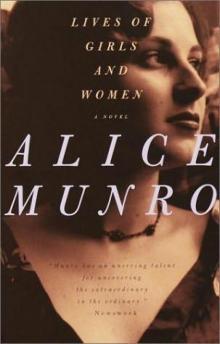 Lives of Girls and Women
Lives of Girls and Women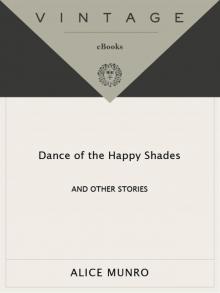 Dance of the Happy Shades
Dance of the Happy Shades Open Secrets
Open Secrets Julieta (Movie Tie-in Edition)
Julieta (Movie Tie-in Edition)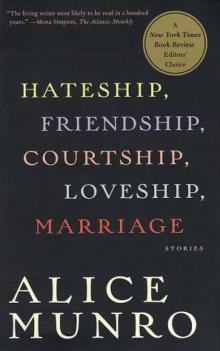 Hateship, Friendship, Courtship, Loveship, Marriage: Stories
Hateship, Friendship, Courtship, Loveship, Marriage: Stories Alice Munro's Best
Alice Munro's Best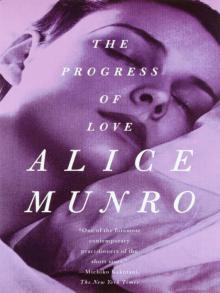 The Progress of Love
The Progress of Love Selected Stories
Selected Stories Away from Her
Away from Her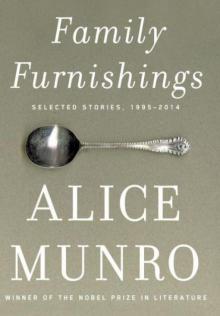 Family Furnishings
Family Furnishings Moons of Jupiter
Moons of Jupiter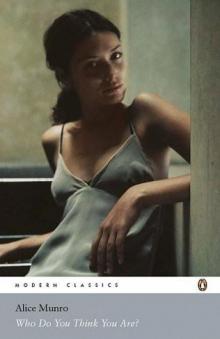 Who Do You Think You Are?
Who Do You Think You Are? Hateship, Friendship, Courtship, Loveship, Marriage
Hateship, Friendship, Courtship, Loveship, Marriage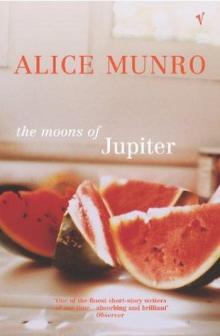 The Moons of Jupiter
The Moons of Jupiter Vintage Munro
Vintage Munro The Love of a Good Woman
The Love of a Good Woman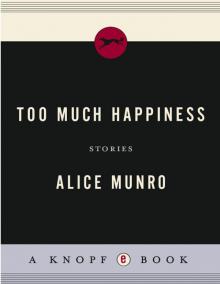 Too Much Happiness
Too Much Happiness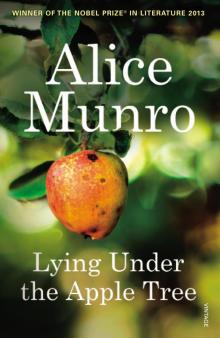 Lying Under the Apple Tree
Lying Under the Apple Tree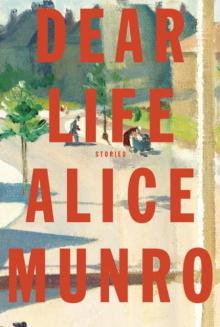 Dear Life
Dear Life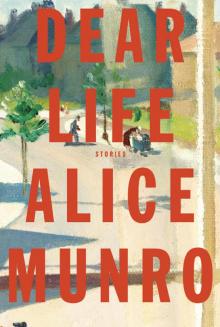 Dear Life: Stories
Dear Life: Stories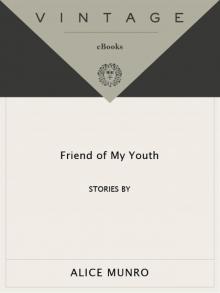 Friend of My Youth
Friend of My Youth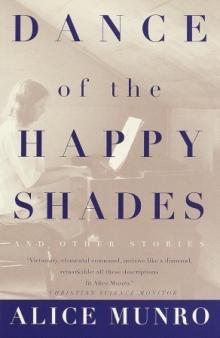 Dance of the Happy Shades: And Other Stories
Dance of the Happy Shades: And Other Stories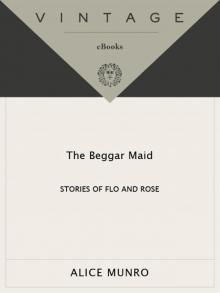 The Beggar Maid
The Beggar Maid